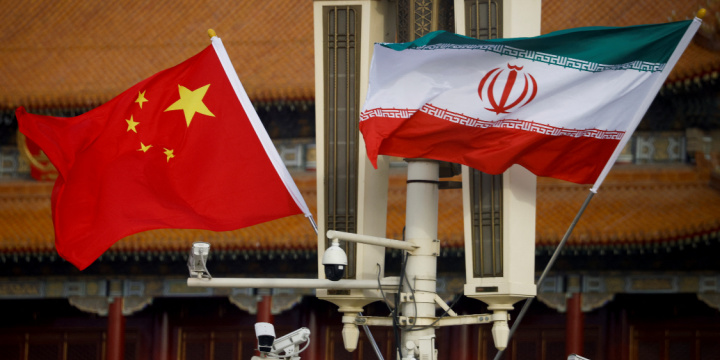The national flags of China and Iran fly in Tiananmen Square during Iranian President Ebrahim Raisi’s visit to Beijing, China, February 14, 2023. Photo: REUTERS/Thomas Peter
China has denied transferring surface-to-air missile batteries to Iran as the Iranian regime seeks to rebuild its air defense systems, which were largely destroyed by Israel during their recent 12-day Middle Eastern conflict.
Citing Arab sources, the Middle East Eye news outlet reported last week that Iran purchased Chinese surface-to-air missile systems (SAMs), which are launched from the ground or sea to destroy aircraft or other missiles, as Tehran scrambles to rebuild its battered air defenses. Tehran reportedly began acquiring the batteries shortly after a US-brokered ceasefire ended the Israel-Iran war last month.
However, China’s embassy in Israel rejected the report in a statement.
“The embassy finds the contents of the report to be incorrect. As a matter of principle, China firmly opposes the proliferation of weapons of mass destruction and their delivery systems, and continuously strengthens its enforcement capabilities regarding non-proliferation,” the embassy told the Israel Hayom news outlet.
“China never exports weapons to countries engaged in warfare and maintains strict controls on the export of dual-use items,” the statement continued. “As a permanent member of the UN Security Council, China upholds a cautious and responsible approach to the export of military-related goods.”
Last month, Israel launched Operation Rising Lion, a sweeping military campaign aimed at dismantling Iran’s nuclear capabilities and neutralizing what officials described as an imminent nuclear threat.
The US joined Israel’s airstrike campaign against Tehran by launching a large-scale military operation that destroyed three key nuclear enrichment facilities, including the heavily fortified Fordow site, ultimately leading to a US-brokered ceasefire.
The exact number of SAMs that Iran has reportedly received from China remains unclear, but sources told the Middle East Eye that the Islamist regime is paying Beijing for the systems with oil shipments. China is the largest importer of Iranian oil, with nearly 90 percent of Iran’s crude and condensate exports going to Beijing.
China, a key diplomatic and economic backer of Tehran, has moved to deepen ties with the regime in recent years, signing a 25-year cooperation agreement, holding joint naval drills, and continuing to purchase Iranian oil despite US sanctions.
Iran’s growing ties with China come at a time when Tehran is facing increasing sanctions by the United States, particularly on its oil industry, as part of the Trump administration’s “maximum pressure” campaign aimed at cutting the country’s crude exports to zero and preventing it from obtaining a nuclear weapon.
For years, China has been importing significant volumes of Iranian oil, often using transshipment hubs like Malaysia to cover up the crude’s true origin.
Chinese officials have also consistently opposed Washington’s sanctions on Tehran and defended the country’s right to enrich uranium.
The reported Chinese military transfer comes at a time when Iran is in urgent need of international support. However, Iran’s supposed allies have largely held back more concrete and robust support despite the conflict with Israel, opting for cautious diplomacy rather than direct backing.
According to Jack Burnham, a research analyst at the Foundation for Defense of Democracies (FDD), a Washington, DC-based think tank, China’s capacity to offer Tehran support beyond diplomatic channels is limited by the country’s inability to effectively manage rapidly evolving crises.
“Having built the foundations of Iran’s missile program, Beijing can now only watch as it goes up in flames — incapable of projecting power on a scale that could tip the balance of power and wary of committing resources during a period of heightened tensions in its own region,” Burnham told The Algemeiner.
The post China Denies Report Saying It Transferred Air Defense Systems to Iran first appeared on Algemeiner.com.
Click this link for the original source of this article.
Author: Ailin Vilches Arguello
This content is courtesy of, and owned and copyrighted by, https://www.algemeiner.com and its author. This content is made available by use of the public RSS feed offered by the host site and is used for educational purposes only. If you are the author or represent the host site and would like this content removed now and in the future, please contact USSANews.com using the email address in the Contact page found in the website menu.








